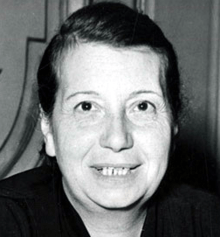Hélène Cazès-Benatar
Hélène Cazès-Benatar (October 27, 1898 – July 7, 1979) was a Moroccan Jewish lawyer and human rights activist. During World War II she organized relief efforts in North Africa for Jewish and other refugees.

Early life
Rachel Hélène Cazès was born in Tangier, the daughter of Amram Cazès and Miriam Nahon. Her family moved to Casablanca in 1917. After completing law studies in Bordeaux, she became Morocco's first woman lawyer.[1]
Career
Cazès-Benatar was active in various charitable causes in Casablanca, including kindergartens and milk for children. During World War II she volunteered with the Red Cross in Casablanca. She organized services for refugees from Europe, as founder and first president of the Moroccan Refugee Aid Committee,[2] including three relief camps in Casablanca.[3]
After the war, she helped many Jewish refugees in North Africa to relocate again to Israel.[4] She toured the United States giving lectures in 1953 and 1954, to raise funds for her work.[5] She was the North African representative of the World Jewish Congress. She wrote the reports on Tangier, French Morocco, and Spanish Morocco for the American Jewish Year Book for 1955.[6]
Personal life
Hélène Cazès married Moses Benatar in 1920. She was widowed when Benatar died in 1939. Hélène Cazès-Benatar moved to Paris in 1962, and died there in 1979, aged 80 years. Some of her papers are preserved in the Central Archives for the History of the Jewish People (CAHJP) in Jerusalem.[7]
References
- Michal Ben Ya'akov, “Cazès-Benathar, Hélène”, in Norman A. Stillman, ed., Encyclopedia of Jews in the Islamic World (consulted online on 27 November 2017).
- "Program Features Famous Film Star" Jewish Post (April 24, 1953): 1. via Hoosier State Chronicles

- "Luna Park, Casablanca, Morocco" Diarna.
- Lili Eller, "Israel Seen as Only Hope for Jews of North Africa" Jewish Post (May 8, 1953): 10. via Hoosier State Chronicles

- "French Heroine to Talk at Life Saver's Luncheon" Miami News (March 16, 1953): 19. via Newspapers.com

- American Jewish Year Book (American Jewish Committee 1955).
- Private Collection Helene Benatar, Central Archives for the History of the Jewish People (CAHJP) in Jerusalem.
External links
- A photograph of Hélène Cazès-Benatar, from the American Jewish Joint Distribution Committee archives.
- A photograph of Hélène Cazès-Benatar with an orphan boy in 1949, from the American Jewish Joint Distribution Committee archives.
- Meredith Hindley, Destination Casablanca: Exile, Espionage, and the Battle for North Africa in World War II (Public Affairs 2017) ISBN 9781610394055, includes a discussion of Cazès-Benatar's work in Casablanca.